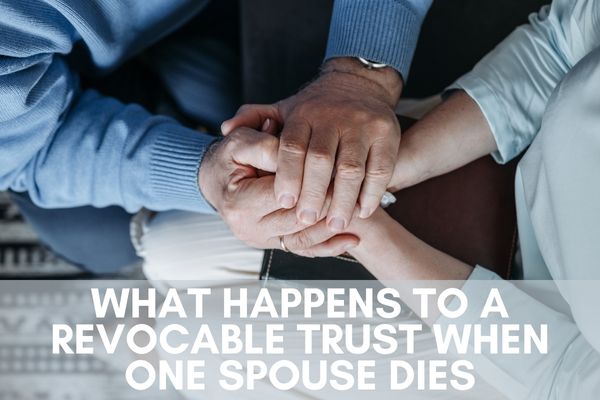“What Happens To a Revocable Trust When One Spouse Dies” Revocable trusts, sometimes known as “living trusts,” allow the grantor to make changes to them at any time. This means that the trust’s grantor, who established the trust, may add or remove assets at any moment. As with other types of trusts, the grantor specifies how the successor trustee is to administer the trust’s assets and distribute them to the beneficiaries in the event of the grantor’s passing or incapacity.

What Happens To a Revocable Trust When One Spouse Dies
If you’re married, you and your spouse could establish a joint revocable living trust. This could be wise if you and your spouse jointly own most of your valued property. It would also function nicely if each partner desired that, in the event of the death of one spouse, the other spouse would receive the totality of the property owned together.
The joint living trust may also receive assets that are personally owned. You could name beneficiaries other than your spouse if you establish a collective living trust and add your personal property to the faith.
Usually, after the death of one spouse, the surviving spouse would become the only trustee. The surviving spouse would manage the pooled assets, while the beneficiaries would receive the deceased spouse’s personal belongings.
A revocable trust becomes irrevocable after the grantor’s passing. As a result, neither assets added to the faith nor assets subtracted from it at the time of death are permitted. Beneficiary designations cannot also be altered in any way. Once the grantor passes away, the trust’s conditions are irrevocable.
A revocable trust must be amended with significant life events, such as the birth of a child or grandchild, divorce, or marriage. By keeping your living trust current, you can ensure that nobody is left out and that the assets you want to protect are distributed according to your wishes when you pass away.
Specifying contingent beneficiaries when establishing a trust is also a good idea.

Does A Revocable Trust Become Irrevocable When One Spouse Dies?
No, a revocable trust does not become irrevocable when one spouse dies. The faith remains revocable and can be changed or revoked at any time by the surviving spouse. The grantor of a revocable trust must name an individual or corporate body to serve as the trust’s trustee. A revocable trust’s terms can be changed. On the other hand, the grantor of an irrevocable trust is not permitted to alter its conditions without the beneficiary’s or beneficiaries’ consent.
One frequently asked topic relates to the difference between irrevocable and revocable trusts. When the trust’s grantor passes away, the revocable trust becomes irrevocable. In most cases, the grantor simultaneously serves as the trust’s trustee and initial beneficiary. A revocable trust’s provisions cannot be changed after the grantor dies, and assets cannot be added or taken away. A new irrevocable trust must have an EIN after the grantor of a revocable trust passes away (EIN). The trust becomes a separate legal entity, necessitating the acquisition of an EIN to file tax returns.
A revocable trust can become irrevocable in two different situations. The second is when the grantor becomes incapable of making choices regarding the trust’s management. A qualified healthcare professional must undertake a thorough medical review to verify the incapacitation diagnosis.
A successor trustee is chosen to manage the trust after the grantor’s incapacity is verified by signing a legal instrument. The belief is regarded as irrevocable only while the grantor has been declared incompetent. The trust reverts to becoming revocable once more if the grantor is sufficiently recovered to regain capacity.
Although it happens frequently, other ways exist to establish a shared living trust. It is possible to designate a beneficiary other than your spouse to receive your share of the joint assets. You could also choose a successor trustee to assume your duties as co-trustee in the event of your death.
Does The Name Of A Revocable Trust Change To Irrevocable Upon Death?
Yes, the revocable trust of the trust grantor becomes irrevocable upon the loss of the grantor’s capacity or death, and the terms of the trust are, after that, virtually unchangeable. Even trusts that the grantor established with the intention that they would be irrevocable at the outset are subject to this rule.

How To Remove A Beneficiary From A Revocable Trust
When a beneficiary of a revocable trust passes away, the trustee must remove them from the trust. You must adhere to state law and faith agreements to achieve this. You must resort to state law if the trust document is silent on how to terminate a beneficiary. To remove a beneficiary, most states demand that the trustee notify the beneficiaries of the change.
It would help if you waited for a predetermined amount after giving notice before removing the beneficiary.
The beneficiaries have a chance to contest the modification during this waiting period. You are free to take the beneficiary out of the trust if there are no objections.
A beneficiary may give up their interest in the trust and request permission from other beneficiaries to leave. The trustee cannot terminate a beneficiary of an irrevocable trust. The grantor can delete a beneficiary in a revocable trust by consulting the legal requirements of the deed.
If the trust explicitly grants the trustee the authority to do so, you can remove beneficiaries from the revocable trust.
The trustee may have the authority to revoke the trust, which would essentially remove the beneficiary if the trustee is the one who made the financial contribution to the trust.
Even if the trustee might have had the authority to remove a beneficiary. While the grantor was still living, this power ended with their passing since, with the grantor’s passing, a revocable trust becomes an irrevocable trust (the person who funded the faith).
What To Do When Your Spouse Dies And You Have A Trust
If you’re married, you and your spouse could establish a joint revocable living trust. This could be wise if you and your spouse jointly own most of your valuable property. It would also function nicely if each partner desired that, in the event of the death of one spouse, the other spouse would receive the totality of the property owned together.
The joint living trust may also receive assets that are personally owned. While the grantor was still living, this power ended with their passing since a reversible belief became irreversible with the grantor’s passing (the person who funded the faith).
Usually, after the death of one spouse, the surviving spouse would become the only trustee. The surviving spouse would manage the pooled assets, while the beneficiaries would receive the deceased spouse’s possessions.
Does A Revocable Trust Become Irrevocable Upon The Death Of A Spouse?
The conventional norm is that before the trust conditions become irrevocable, both grantors must pass away. Although this is the default, there are ways to change it, as with many legal matters. The document that creates the trust governs the trust’s conditions. So long as they are not illegal, the people who make the trust have the power to decide on the ground rules for how it will operate.
It is simple to assume that the successor trustee has the authority to make adjustments because they manage the trust after the grantor passes away. However, once the grantor dies and the trust becomes irrevocable, nobody can alter it. The successor trustee must follow the grantor’s instructions for managing the faith by the law.
Although you can change the trust to make it irrevocable after the passing of one spouse, this only happens once both grantors have passed away. A joint revocable trust can be amended as long as you live, even after your spouse has passed away.
These problems can be resolved in a few different ways that can be first incorporated into the trust. To begin with, the estate planning lawyer can add particular language to get around the standard regulation that stipulates that both spouses must pass away before the trust becomes irrevocable.
If a clause states that the trust becomes irrevocable upon the passing of one of the grantors, this will govern the trust. Couples frequently act this way when there is concern about undue influence as both spouses age. If one grantor passes away before the other, another choice can be made to offer some protection to trust beneficiaries.
The trust can continue to exist, but the decision-making for the faith can be transferred to a successor trustee. Someone other than the surviving spouse would serve as this successor trustee. While typically accompanied by language limiting a successor trustee to situations in which the surviving spouse is incompetent, there could be wording requiring a successor trustee regardless of whether there is concern over what the surviving spouse may do.
Conclusion
It’s good to keep in mind that a revocable trust automatically divides into two trusts after the passing of one of the spouses. Half of the trust’s assets and the spouse’s separate holdings will go into each trust. The trustee for both trusts is the survivor spouse.







